To accompany your Come Follow Me study for June 30-July 6
In addition to reading these five sections this week, you may enjoy reading the following related commentary:
- Chapter 26: Doctrine and Covenants 71–75 (churchofjesuschrist.org)
- Joseph Smith’s Revelations, Doctrine and Covenants 71 (churchofjesuschrist.org)
- Joseph Smith’s Revelations, Doctrine and Covenants 72 (churchofjesuschrist.org)
- Joseph Smith’s Revelations, Doctrine and Covenants 73 (churchofjesuschrist.org)
- Joseph Smith’s Revelations, Doctrine and Covenants 74 (churchofjesuschrist.org)
- Joseph Smith’s Revelations, Doctrine and Covenants 75 (churchofjesuschrist.org)
You may also enjoy the following video:
If you would like a Kahoot game related to these sections which you could use with your family or class, click here: https://create.kahoot.it/share/doctrine-and-covenants-71-75/575b5353-4efc-4079-af19-2def4c8d3654. To use it with a group, after clicking on this link, you will need to log into Kahoot, creating a free account if you have not done so previously, then click on the blue “Host Live” button or the gray “Assign” button, depending on how you wish to use the Kahoot. Some of the Kahoot questions may presuppose that the player has read through the suggested answers to the following Points to Ponder and at least has browsed the Institute student manual as well.
Points to Ponder in Doctrine and Covenants 71-75
1. (Multiple choice) The major point of D&C 71 was that Joseph Smith and Sidney Rigdon were to
a. proceed to complete their translation of the Bible as soon as possible
b. publicly rebut the allegations of apostates
c. strengthen the Church in the regions round about
d. prepare for the coming of the Lord
2. Why was it so important for Joseph Smith and Sidney Rigdon to spend so much time on the translation of the scriptures–especially when the Church would never publish it?
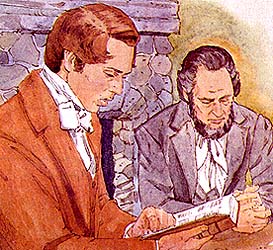
3. If the “mysteries” of the kingdom can be expounded out of the scriptures, how can they be considered “mysteries”? (71:1)
4. In what sense does missionary work prepare the way for “commandments and revelations which are to come”? (71:4) Wouldn’t such revelations come anyway?
5. Why did the Lord instruct Joseph Smith and Sidney Rigdon to engage in public debates (71:7), but missionaries today are taught to avoid them?
6. What would be the most likely effects, positive or negative, of a debate between a Latter-day Saint missionary and an anti-Mormon minister on a radio talk show?
7. How could the Lord promise that no weapon would prosper against Joseph Smith (71:9) when He knew that within 13 years the Prophet would be shot to death in Carthage?
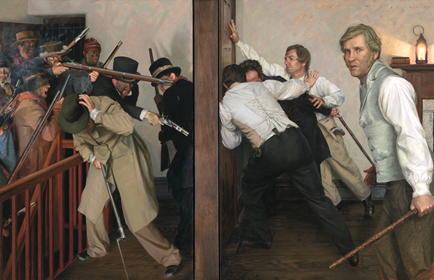
8. What passage in D&C 72 could be considered a scriptural justification for reports?

9. What are the major occasions or settings in which stewards render an account of their stewardships in the Church today?
10. D&C 73 modified instructions given in what previous section?
11. Which verse in D&C 74 is a verbatim quote from the Bible?
12. What is the most important point of D&C 74 for us today?
13. Does 74:5 mean that Paul approved of interfaith marriages, provided the children could be raised in the Christian faith? Would the same be true today?

14. If only one member of a couple joins the Church, should he or she divorce the unbelieving partner in order to be free for a temple marriage to someone else? Does it matter what the attitude of the unbelieving spouse is toward the Church?

15. What does 74:1 mean when it says the unbelieving husband is sanctified by the wife, and vice-versa? Aren’t all sanctified by the atonement and not by the spouse?
16. (Multiple choice) A review of the related footnotes suggests that the word “sheaves” in 75:5 means:
a. converts
b. blessings
c. opportunities
d. revelations

17. The instructions to missionaries to go to the “eastern countries,” “western countries,” or “southern countries” seem rather vague (75:6-15). How would the missionaries ever know whether or not they were where they were supposed to be?

18. How is it possible for missionaries to be “filled with joy and gladness” at the prospect of condemning at judgment day those who reject their message? (75:20-22)

19. What modern applications can you see for the principle outlined in 75:28? To what extent does the Lord take into account differences in personal circumstances? Are some excused from missions today for the same reason? Are some justified in spending less time in genealogical research, temple attendance, or other religious activities than others?
Possible Answers to Points to Ponder in Doctrine and Covenants 71-75
1. (Multiple choice) The major point of D&C 71 was that Joseph Smith and Sidney Rigdon were to
a. proceed to complete their translation of the Bible as soon as possible
b. publicly rebut the allegations of apostates
c. strengthen the Church in the regions round about
d. prepare for the coming of the Lord
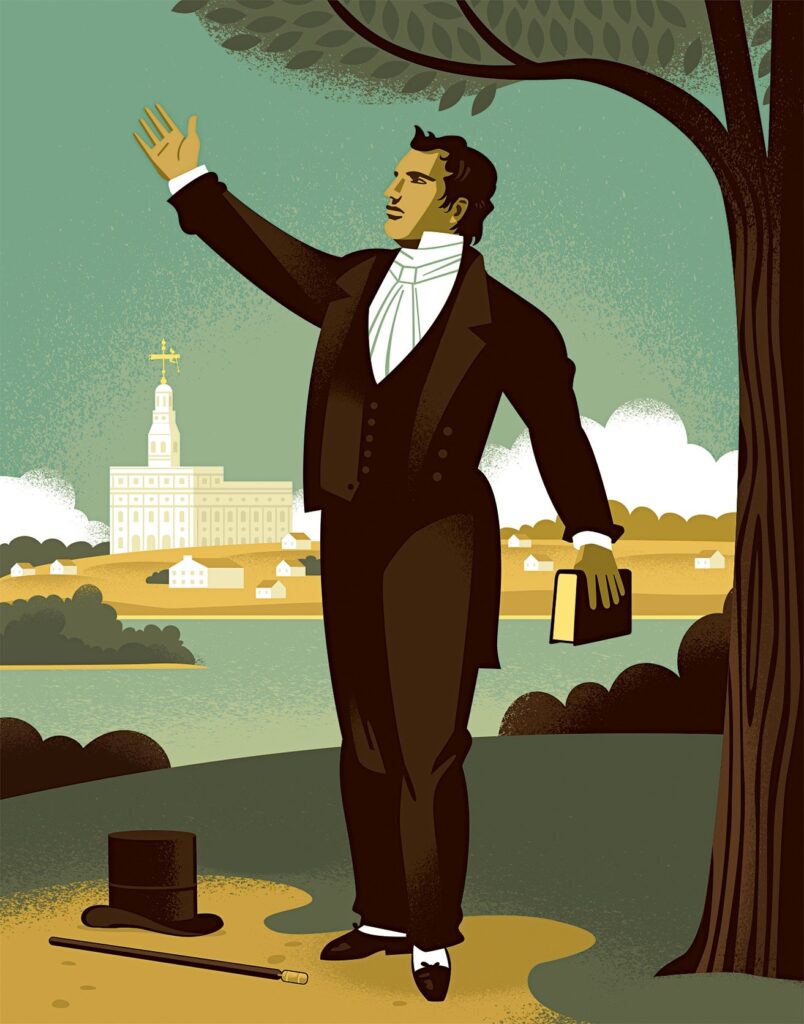
2. Why was it so important for Joseph Smith and Sidney Rigdon to spend so much time on the translation of the scriptures–especially when the Church would never publish it?
Purposes would include:
- the scriptural education of a young prophet
- serving as a catalyst for revelations, such as Moses 1-7 and Joseph Smith-Matthew, and numerous passages included in the footnotes of the Latter-day Saint publication of the Bible or in the appendix at the end
- providing a model of scripture study which all of us could adopt
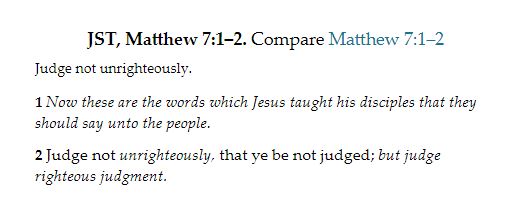
3. If the “mysteries” of the kingdom can be expounded out of the scriptures, how can they be considered “mysteries”? (71:1)
Because the world as a whole does not understand them. The Spirit is required to make them fully known, as is seen in 71:1.
4. In what sense does missionary work prepare the way for “commandments and revelations which are to come”? (71:4) Wouldn’t such revelations come anyway?
Some revelations have prerequisites. For example, a revelation to build a certain temple would depend on their being a sufficient number of members in the area to warrant it, as would revelations concerning the calling of local leaders to attend to the needs of those new members.
5. Why did the Lord instruct Joseph Smith and Sidney Rigdon to engage in public debates (71:7), but missionaries today are taught to avoid them?
Their debates were to serve to uplift and convince the spectators, not those with whom they would be debating. The default rule is that missionaries don’t debate or contend, but the Lord commanded it on this occasion to counteract the negative influence Ezra Booth’s writings had had on members and non-members alike.
6. What would be the most likely effects, positive or negative, of a debate between a Latter-day Saint missionary and an anti-Mormon minister on a radio talk show?
Most likely the minister would make the missionary look foolish, and a spirit of contention would probably be present. It is possible that if the missionary kept calm and spoke by the Spirit some listeners would be touched, though the minister probably would not.
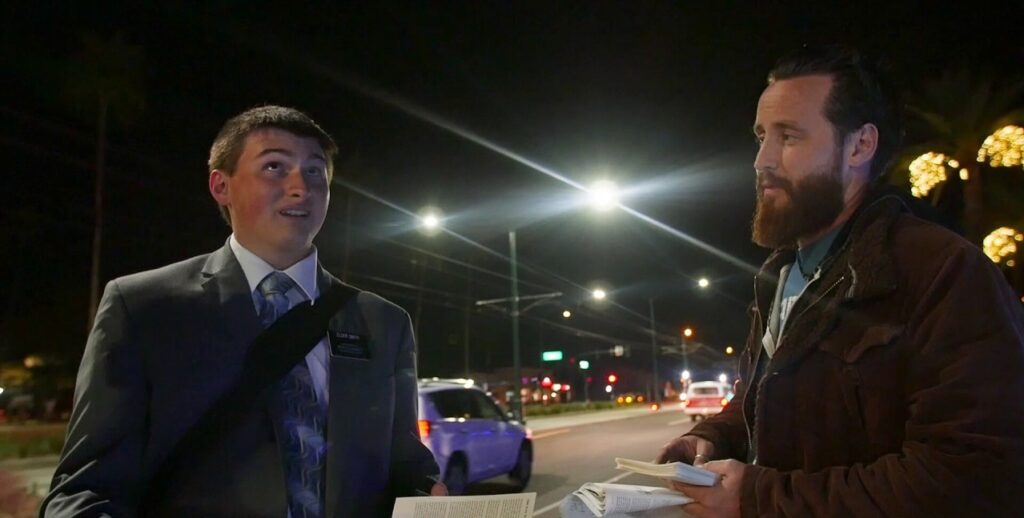
7. How could the Lord promise that no weapon would prosper against Joseph Smith (71:9) when He knew that within 13 years the Prophet would be shot to death in Carthage?
The Lord is talking about the long term, here. As He goes on to say in verse 10, those who should lift a voice against the Prophet would be “confounded in mine own due time.” Joseph’s getting shot in Carthage only hurt briefly, but we have every reason to believe he’s doing great now, while those who shot him aren’t likely to feel happy again for at least a thousand years.
8. What passage in D&C 72 could be considered a scriptural justification for reports?
72:3
9. What are the major occasions or settings in which stewards render an account of their stewardships in the Church today?
They would include:
- Ministering interiews
- Temple recommend interviews
- Submission of priesthood or auxiliary reports by secretaries
- Tithing settlement
- Ward council members reporting to the council on the completion of assignments given.
- Counselors and secretaries reporting back to organizational heads

10. D&C 73 modified instructions given in what previous section?
71. They now are instructed to resume translation work on the Bible. (73:3)
11. Which verse in D&C 74 is a verbatim quote from the Bible?
v. 1
12. What is the most important point of D&C 74 for us today?
Probably that little children are holy, with the implication we should treat them as such.
13. Does 74:5 mean that Paul approved of interfaith marriages, provided the children could be raised in the Christian faith? Would the same be true today?
It seems he differentiated between contracting new inter-faith marriages, which he opposed, versus disrupting previously contracted ones, which he also opposed, unless the non-member spouse brought such a negative influence into the home that it was harmful to the children. The same standards would apply today. See comments on the following related question, as well.
14. If only one member of a couple joins the Church, should he or she divorce the unbelieving partner in order to be free for a temple marriage to someone else? Does it matter what the attitude of the unbelieving spouse is toward the Church?
Certainly, one would not want to divorce a non-member spouse for trivial reasons. As Paul said, “If any brother hath a wife that believeth not and she be pleased to dwell with him, let him not put her away. And the woman which hath an husband that believeth not, and if he be pleased to dwell with her, let her not leave him.” A loving and happy spouse is the best missionary the non-member spouse is every likely to encounter. That is what Paul means a couple of verses later when he says, “For what knowest thou, O wife, whether thou shalt save thy husband? Or how knowest thou, O man, whether thou shalt save thy wife?”
No priesthood leader, ministering elder or sister, or friend should ever advise someone to pursue a divorce. Should it become necessary, that is a very personal decision, which should be made only after much effort to save the marriage and much prayer and seeking confirmation from the Lord. But sometimes it does become a necessary choice. As Latter-day Saints regard the Declaration of Independence of the United States to be an inspired document, perhaps the standards expounded there to justify breaking ties with England could be adapted to provide grounds for breaking marital ties. The Declaration stated:
“Prudence, indeed, will dictate that Governments long established should not be changed for light and transient causes; and accordingly all experience hath shewn, that mankind are more disposed to suffer, while evils are sufferable, than to right themselves by abolishing the forms to which they are accustomed. But when a long train of abuses and usurpations, pursuing invariably the same Object evinces a design to reduce them under absolute Despotism, it is their right, it is their duty, to throw off such Government, and to provide new Guards for their future security.”
So, if the unbelieving spouse (most often the husband) is willing to let his wife be active in the Church and keep her covenants, there is much to be gained by her staying married to him and using her loving influence to help her husband wish that their marriage could last forever and help him be willing to investigate whether the claims of the Church on that subject might be valid. But if he is perpetually abusive, domineering, and refuses to allow his wife to fulfill her commitment to put no other gods before the true one, she could well decide it was time to prayerfully seek answers from the Lord as to her next step.
15. What does 74:1 mean when it says the unbelieving husband is sanctified by the wife, and vice-versa? Aren’t all sanctified by the atonement and not by the spouse?
Paul’s language, as it has come to us in the King James translation, is a bit confusing. I like Smith and Sjodahl’s proposed explanation in their Doctrine and Covenants Commentary:
“In the Corinthian Church, some evidently held that when the husband, or wife, had been converted, he, or she, ought to abandon the unconverted partner as unclean and contaminating Not at all! St. Paul says, in substance, that the conversion of one of the partners has brought a sanctifying influence into the family. As Meyer puts it, “The non-believing partner in a marriage * * * becomes partaker—as if by sacred contagion—of the higher, divinely consecrated character of his consort.” “Else,” the Apostle argues, “were your children unclean.” If the wife—this is the argument—must abandon a husband because he is not a Church member, she would also be obliged to abandon her children. But this is not required.
“The consecration of the believing parent includes the children. They are sanctified through the atonement of our Lord. They need no ordinance, until they arrive at the age of accountability, when they should be baptized, after proper instruction. Christians were forbidden to marry outside the Church (II. Cor. 6:14), but marriages contracted before conversion were not to be broken up, if the unconverted partner desired to continue the marriage relation.”
16. A review of the related footnotes suggests that the word “sheaves” in 75:5 means which of the following?
a. converts
b. blessings
c. opportunities
d. revelations
17. The instructions to missionaries to go to the “eastern countries,” “western countries,” or “southern countries” seem rather vague (75:6-15). How would the missionaries ever know if they were where they were supposed to be?
In much the same way as missionaries today would decide on which street to knock doors, or with which members or non-members to meet on a given day—asking for the Lord’s guidance, studying the options, making the best decision they could, and then seeking divine confirmation of the acceptability of their choice. Sometimes there are equally good opportunities in whichever city or on whichever street a missionary chooses to look for potential converts.
18. How is it possible for missionaries to be “filled with joy and gladness” at the prospect of condemning at judgment day those who reject their message? (75:20-22)
We learn from the scriptures that God Himself can simultaneously feel two seemingly opposite emotions. Though He has a fulness of joy, yet He weeps for the pain some of His children choose to go through. So it is with faithful missionaries. They are entitled to feel the joy which comes through the Spirit as they faithfully discharge their duties, even as they will surely sorrow to have to bear witness on judgment day against those who rejected them.
19. What modern applications can you see for the principle outlined in 75:28? To what extent does the Lord take into account differences in personal circumstances? Are some excused from missions today for the same reason? Are some justified in spending less time in genealogical research, temple attendance, or other religious activities than others?
Certainly, the Lord expects more of those who have available time and resources than He does of those who have personal limitations or family responsibilities that would prevent their doing more. As the Lord through His prophets has indicated today that every able and worthy young man should serve a full time mission, we can expect Him to open up the way to make that possible. But senior couples, for example, are not under the same obligation, as some will have health issues, dependent children, or limited economic means. Still, most will be able to serve one or more Church service missions, while living at home, even if they are unable to leave their home for 6-23 months. Similarly, some will have means and opportunities to attend the temple, do family history work, or otherwise serve locally with much greater frequency than others. The Lord will reward each according to what he or she did with the opportunities available.
